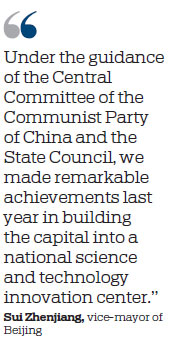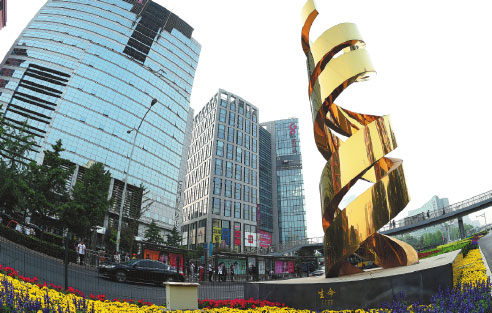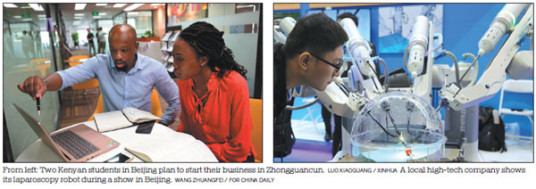Beijing becoming hub of science, technology
Patent applications, authorizations, research prizes advance as government lays out plans for innovative development
Beijing made great strides in 2018 developing a national science and technology center, with several nationally and globally renowned organizations rating the city as one of the world's leading science and technology hubs.
In 2014, central authorities proposed positioning Beijing as the national center not only for politics, culture and international exchanges but also for science and technology innovation.
The Capital Institute of Science and Technology Development Strategy, a Beijing-based research institution, ranked Beijing No 1 on its 2018 Science and Technology Index for Chinese Cities.
CB Insights, a market research firm based in the United States, rated Beijing as one of the world's fastest-growing science centers last year.
In the Nature Index 2018 Science Cities supplement, which was published by the United Kingdom-based Nature magazine, Beijing was ranked first among 500 cities worldwide.
"Under the guidance of the Central Committee of the Communist Party of China and the State Council, we made remarkable achievements last year in building the capital into a national science and technology innovation center," Sui Zhenjiang, vice-mayor of Beijing, told a conference earlier this month.
According to Xu Qiang, head of the Beijing Municipal Science and Technology Commission, Beijing again led the country in terms of investment in research and development.
In 2018, the numbers of patent applications and authorizations grew 13.6 percent and 15.47 percent respectively, both ranking first in the country, according to statistics of the commission.
A total of 69 research results from Beijing won national science and technology awards, accounting for 30.8 percent of the nation's total. The city has secured the first prize for three consecutive years.
Last year, the city launched 224 key projects for promoting the construction of the national science and technology innovation center and 96 percent of the projects were completed, according to the commission.
"The achievements were made thanks to the city's strategy to accelerate innovation targeting the world's frontier fields, serving the real economy and meeting the demands of the nation," Xu said.
Global vision
Earlier in January, Beijing Mayor Chen Jining highlighted a "global vision" in guiding Beijing's development into a national science and technology innovation center.
Chen made the remarks in his Government Work Report on Jan 14 during the annual session of the People's Congress of Beijing.

He noted that the city will continue to implement an innovation-driven strategy this year to maintain Beijing's leading role in science and technology.
The mayor said Beijing will further deepen its reforms in the system of science and technology.
He required Zhongguancun, the nation's leading innovation demonstration zone, to pilot the reforms, which cover such fields as increasing local companies' and scientists' autonomy in operating research institutions, fostering third-party technology service markets, cultivating professional organizations and experts, reforming the technology-oriented financial industry to better serve growth companies, facilitating transfer of technologies, increasing governments' purchase of tech products and services and improving public services for companies.
Talking about the global vision, the mayor said the government will help expand channels for international cooperation, introducing more global businesses and professionals.
Chen said Beijing especially welcomes multinational companies to establish R&D facilities and incubators here, helping the city better integrate with a global network for science and technology innovation.
The government efforts include organizing the annual Zhongguancun Forum for global tech companies and related enterprises, and helping local companies take part in drafting global industry standards.
The mayor said Beijing will use the Beijing Natural Science Fund to boost research in frontier areas such as quantum communications, smart manufacturing, robots and deep space exploration.
Chen said Beijing aims to build itself into a favored destination for international professionals. The city will continue to implement a plan for cultivating young and promising entrepreneurs and professionals in various tech fields.
To offer bases to professionals to start their businesses, Chen said Beijing will devote more energy in developing major industrial areas including the Zhongguancun Science City, Huairou Science City, Future Science City and Beijing Economic-Technological Development Area.
The city's priority areas for high-tech development this year include advanced manufacturing, artificial intelligence, biological and health science, 5G communications and industrial internet, new-energy automobiles, high-definition displays, integrated circuits and third-generation semiconductors, according to the mayor.
 |
|
Zhongguancun in Beijing's Haidian district is China's leading area for science and technology innovation.Luo Xiaoguang / Xinhua |

